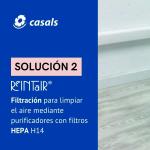HEPA is the acronym for High Efficiency Particle Air, but this term is often used in a misleading way and it is necessary to clarify some concepts to avoid confusion.
HEPA has always been linked to the needs of clean rooms, operating rooms or similar. Very sensitive spaces that need the security of particle-free air quality. To guarantee this correct treatment, these filters must pass a rigid test according to the conditions of a European standard, EN1822. It is the only way to validate its real efficiency.
In many of the air purification equipment on the market (approximately 90%), the built-in filters do not have this certification, so there is NO guarantee of the correct operation of the equipment.
The existence of these equipments, arising from the current need, it is very dangerous since they generate a false sense of security in the population, causing them to relax the tension and finally causes an opposite effect to the desired one.
Casals air purifiers such as REINTAIR®, REINTDECK, REINTDECK EASY and CURAT SYSTEM have certified HEPA filters according to EN1822, each one of these filters being plasticized and individually certified.
This document clarifies all doubts about:
-
Why is it not enough to ventilate and wear a mask to avoid the spread of viruses?
-
How can the virus be neutralized in the environment?
-
How to correctly distinguish a good HEPA filter?
-
What are the filters approved according to EN1822?
-
Why is HEPA preferable to ULPA if the second one has an ability to capture more and smaller particles?
-
Difference between working in depression or overpressure in rooms to avoid contagion of diseases
-
Why are Casals REINTAIR® air purifiers so reliable?
